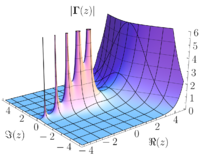Residue (complex analysis)

Okay kiddo, so imagine you have a cake and you cut out a piece to eat. The part left over is called the residue.
But in complex analysis, we're talking about functions instead of cakes. A function is like a recipe that takes a number and spits out another number.
Let's say we have a function called f(z) and we want to figure out what happens when we cut out a piece of it. We do this by looking at a special point called a singularity. A singularity is like a part of the function where something funny happens, kind of like a bump on a road.
Now imagine we draw a little circle around the singularity. Inside that circle, the function goes kind of crazy and doesn't work like it usually does.
But we can still figure out what's happening by looking at the residue. The residue is like the part of the function that's left over after we take out the singularity. It's like the part of the cake that's left over after we take out a piece.
To find the residue, we use some tricky math called complex calculus. We look at how the function behaves as we get closer and closer to the singularity, and we can use that information to figure out what the residue is.
The residue is really important for figuring out how functions behave around singularities. It helps us understand things like poles and how functions behave when we try to divide by zero.
So that's what a residue is! It's the part of a function left over after we take out a singularity, kind of like the residue left over after we eat a piece of cake.
But in complex analysis, we're talking about functions instead of cakes. A function is like a recipe that takes a number and spits out another number.
Let's say we have a function called f(z) and we want to figure out what happens when we cut out a piece of it. We do this by looking at a special point called a singularity. A singularity is like a part of the function where something funny happens, kind of like a bump on a road.
Now imagine we draw a little circle around the singularity. Inside that circle, the function goes kind of crazy and doesn't work like it usually does.
But we can still figure out what's happening by looking at the residue. The residue is like the part of the function that's left over after we take out the singularity. It's like the part of the cake that's left over after we take out a piece.
To find the residue, we use some tricky math called complex calculus. We look at how the function behaves as we get closer and closer to the singularity, and we can use that information to figure out what the residue is.
The residue is really important for figuring out how functions behave around singularities. It helps us understand things like poles and how functions behave when we try to divide by zero.
So that's what a residue is! It's the part of a function left over after we take out a singularity, kind of like the residue left over after we eat a piece of cake.
Related topics others have asked about:
